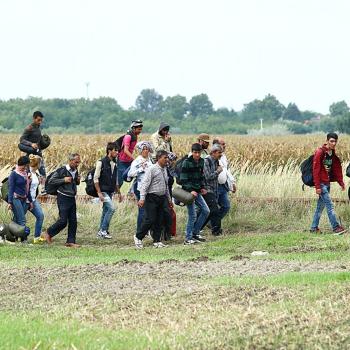Sometimes I wonder why so many people (but especially the media!) are fascinated, even obsessed, with the end of the world. Today, of course, is December 21–the date supposedly identified by an ancient Maya calendar as the end of the world. The build up to it has been years long. Some people have traveled the world to be in just the right place either to greet the world’s end or survive it. (What would it mean to “survive” the end of the world?)
I have to admit, I haven’t paid much attention to this current wave of popular apocalypticism. It seems they come and go so frequently and and are so drawn out and over exposed (by the media) that now there is always at least one and sometimes two simultaneous ones–at least overlapping each other.
I got my “fill” of apocalypticism as a child and youth. My church and family were absolutely obsessed with the “second coming of Jesus”–what scholars call the “parousia.” We were passionate pretribulational premillennialists. We even sang songs in church about it. Before Larry Norman popularized his song “I Wish We’d All Been Ready” we were singing “The Lord’s Return to Earth”–a premillennial hymn (“Satan will be bound a thousand years; we’ll have no tempter then, after Jesus shall come back to earth again”).
I was present at the world premier of the movie “Thief in the Night.” (One of my uncles was an investor in the film and it premiered in the city where I then lived and attended college.) Around our home and church were pre-Hal Lindsey books about the “rapture” by dispensationalists like Clarence Larkin. The main reason I never attended a movie in a theater before age 19 was that I believed if the rapture happened and I was in a movie theater, watching a Hollywood movie (as opposed to, say, a Billy Graham film) I’d be left behind.
Now, I’ll have to admit, I was pretty confused about what was going to happen after the rapture–to those of us who were taken away. My male teenage friends and I expressed (only to each other) our fervent hope that Jesus would wait to return until after we had sex (which wasn’t going to happen until we got married). At least one of my friends couldn’t wait. I’m sure our belief in the imminent rapture played into his decision not to wait for marriage. I say we were confused because, of course, we also believed (or were supposed to) that we would dwell on earth in Christ’s millennial world. We didn’t believe (or weren’t supposed to) in a purely spiritual millennium. The millennium would be very this-worldly but changed so that Christ and his values would reign.
I can remember one older friend who had taken classes on eschatology expressing his intent to miss the rapture so that he, unlike the rest of us raptured ones, would hide out during the Great Tribulation and survive the horrible persecutions of the Antichrist and then enter the millennium with his physical body. That way he could have sex during the millennium. He assured us, those who hoped to be raptured, that we would be given new bodies that can’t have sex. Pentecostal teenage boys are pretty much like others in certain ways.
All that “rapture fever” aside, what should we Christians make of popular apocalypticism that seems to have gripped America if not the world? How should we respond?
Well, I hope preachers will take opportunities like this to speak to their congregations about the biblical hope as explained, for example, by N. T. Wright in Surprised by Hope. What he says there isn’t new; it’s just his reiteration of what biblical, orthodox Christians have always believed when their minds were not confused by popular culture and wild-eyed Christian apocalypticists.
Roman 8:18-25 should be preachers’ chosen text on this subject. The Christian hope is the resurrection of this world to a new form of life analogous to Jesus’ resurrected (changed) body–freed from bondage to decay but still, nevertheless, this world. The “end of the world,” then, simply means the end of this world as we know it under the curse of the fall–in bondage to decay. But “world without end” refers to this world liberated, renewed, made fully alive.
Some years ago I wrote an article about the resurrection of the cosmos (world) that was published in the journal Ex Auditu: “Resurrection, Cosmic Liberation, and Christian Earth Keeping” Ex Auditu 9 (1993), pp. 123-32. There I argued that Christian eschatological hope, far from being a hindrance to care for this world, is a motive for Christian stewardship of the environment.
I have come to the place where whenever I hear of another “end of the world” scenario I just yawn and pay little or no attention. I don’t believe in any “end of the world.” I believe in the “world without end” promised by God. According to legend (which doesn’t mean it’s not true) Luther was once asked what he would do if he knew for sure that Christ would return the next day. According to the story, he said “plant a tree.”
















